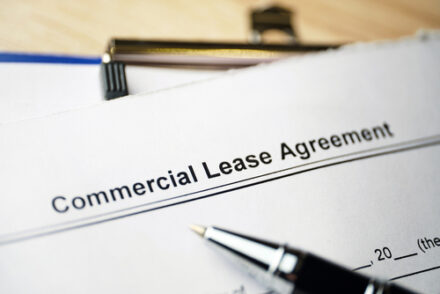
Renewing or extending your commercial lease
9th March 2022 by Mark Preece
When a commercial lease is due to end, both landlord and tenant will consider their business plans to decide whether they want to put a new or extended lease in place. Many business tenants have an automatic statutory right to ask for a new lease when their existing one ends, and if the landlord and tenant cannot agree on the terms, they can go to court to get the dispute settled. This does not apply to all commercial leases though and, even where it does, it often suits both landlord and tenant to agree terms for a new lease, especially if they want a short-term arrangement.
‘Negotiating a new lease is a good time for both parties to seek changes, for example changing the rent, adding flexibility to end the lease, and perhaps new clauses to reflect the growing green agenda,’ says Mark Preece, head of the commercial property team with Laceys Solicitors.
If a landlord wants to avoid an empty unit at the end of the lease, the tenant may be able to negotiate more favourable lease terms. Tactics and bargaining position are important, so it pays to get legal advice early on.
Statutory lease renewals
Unless the landlord and tenant have agreed to contract out of the security of tenure provisions in the Landlord and Tenant Act 1954, leases of business premises will automatically continue at the end of the initial letting period when the tenant is still occupying.
The tenant also has a statutory right to apply for a new lease, the terms of which can be settled in court if the landlord and tenant cannot agree. To make use of this right, the parties must follow the correct statutory process which means advice from an experienced solicitor is crucial. Court proceedings will cost money, for example in relation to collating evidence as well as attempting to negotiate a settlement.
The court has a fairly broad discretion about the provisions it can order in the new lease, but this means the parties must justify what they are asking for by providing evidence. The starting point is that the new lease should be on the same terms as the expired lease. The parties can argue for changes, but the court may refuse. It is important to note that there are also some statutory limits on the lease provisions the court can order. For example:
- the court can order a maximum letting period of 15 years, although it has discretion to grant a shorter lease; and
- the rent will be settled by reference to a statutory valuation formula, with no discretion for the court to order something different.
These statutory rights are useful but, if the parties are already in broad agreement, it can be much quicker and cheaper to negotiate a new or extended lease. There are two approaches.
A reversionary lease
If the existing lease has a while to run but the landlord and tenant both want the certainty of knowing that the letting arrangement will continue, they can enter into an additional lease which will start to run immediately the existing one ends. The technical name for this is a ‘reversionary lease’. This arrangement is sometimes referred to casually as an ‘extension’ of the existing lease because that is the practical effect, but it is important to note that it is not possible to vary an existing lease to extend the letting period. The advantage to both parties is that they can enter into a reversionary lease well in advance of the end of the existing one. The reversionary lease could be on exactly the same terms as the existing one or the parties could agree changes.
A new lease
The other approach is to negotiate a new lease which will be granted only after the existing one ends. As with a reversionary lease, the parties are free to agree whatever terms they like. Depending on how far in advance they start talking, they could enter into an agreement which will bind both parties to enter into the lease when the existing one ends. The agreement could be conditional, perhaps on works being done by the landlord or on consent from a lender. Whether or not it is conditional, the agreement for lease must include the full agreed version of the lease which will be granted, so it cannot be used to short-circuit negotiations.
Opportunity for change
Negotiating a new lease is a chance for the parties to ask for changes to the existing provisions. If the landlord is keen to keep the tenant in the property, the tenant may be able to negotiate useful changes, such as a rent-free period or perhaps a lower rent, to reflect changes in the local letting market.
The pandemic saw a shift towards rents based in whole or in part on the tenant’s turnover, and in some cases tenants were able to negotiate clauses which would give them a rent holiday if there was a lockdown in the future. None of these are available to tenants as of right, so they may need to accept changes the landlord wants in return. For example, the growing emphasis on action to deal with climate change means many landlords are keen to add lease provisions allowing them to make energy efficiency improvements and, where possible, share the cost with their tenants.
How we can help
Whether a tenant is applying for a statutory lease renewal or making a commercial deal for a new lease, both parties need advice from an experienced property lawyer. This will help them identify what they want and need, and will ensure both landlord and tenant get the best outcome while reducing the likelihood of disputes now or in the future. If you would like further advice on this subject please contact Mark Preece on 01202 377800 or email m.preece@laceyssolicitors.co.uk
This article is for general information only and does not constitute legal or professional advice. Please note that the law may have changed since this article was published.



